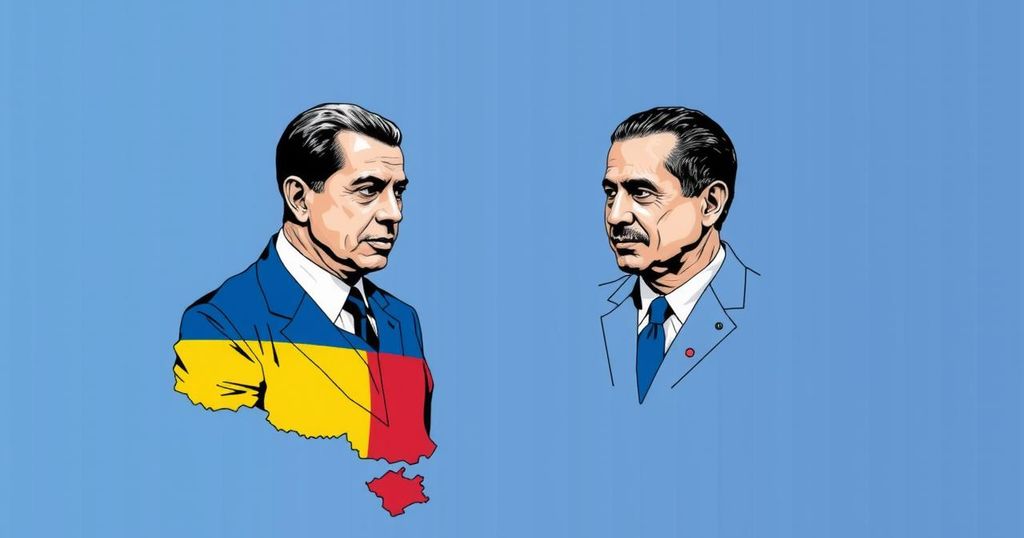Politics
BIDEN, CORRUPTION, CUBA, DEMOCRACY, DEPARTMENT OF THE TREASURY, EDMUND, EDMUNDO GONZÁLEZ, EUROPE, GONZALEZ, GONZÁLEZ, HIGH COURT, MAD, MADURO, NICOLAS MADURO, NICOLÁS MADURO, NORTH AMERICA, OFFICE OF THE PRESIDENT, POLITICS, PRESIDENTIAL ELECTION, SOUTH AMERICA, SPAIN, TRADE RELATIONS, UNITED STATES, VENEZUELA
Isaac Bennett
0 Comments
U.S. Imposes Sanctions on Maduro Allies Following Controversial Election
The U.S. has sanctioned 21 of Maduro’s allies for their roles in election repression, recognizing Edmundo González as the legitimate president-elect. The sanctions aim to address human rights abuses while the Venezuelan government faces scrutiny for transparency in the electoral process. Internal debates on sanction legality continue as political unrest persists in the country.
The United States has enacted sanctions against 21 additional associates of Venezuelan President Nicolás Maduro, alleging their involvement in the suppression of civil liberties following the contentious presidential elections held in July. Among those sanctioned by the Department of the Treasury are head officials from various government entities, including the corrections agency and an intelligence service. These sanctions are part of a broader strategy to hold accountable individuals implicated in the Venezuelan government’s repressive measures against dissent.
The Biden administration recently recognized opposition candidate Edmundo González as the legitimate president-elect of Venezuela. In conjunction with the sanctions, the United States has also imposed visa restrictions on individuals accused of participating in the repression against Venezuelan citizens post-election. This geopolitical tension is ongoing, as the Maduro government faces increasing pressure to provide transparency regarding the electoral outcome, which it has yet to substantiate.
In September, González, who left Venezuela for Spain after receiving an arrest warrant, has claimed to have secured a decisive victory over Maduro in the elections. Previous sanctions imposed on Maduro and his allies have resulted in a politically charged atmosphere within Venezuela, where lawmakers are currently deliberating a bill categorizing economic sanctions as a crime against humanity.
Despite the sanctions aimed at Maduro’s inner circle, their enduring influence within the government’s structure raises questions about the effectiveness of these punitive measures. The ongoing unrest reflects the complexity of Venezuela’s political landscape as it struggles with both internal dissent and external pressures from the international community.
Therefore, the recent sanctions and visa restrictions imposed by the U.S. against Maduro’s allies highlight a continued commitment to addressing human rights abuses and supporting democratic processes in Venezuela, despite the challenges posed by established political powers in the country.
The situation in Venezuela has been marked by political instability, particularly following the disputed presidential election in July, where President Nicolás Maduro’s legitimacy has come under question. The United States’ sanctions target key figures in Maduro’s government, aiming to address human rights violations and a lack of electoral transparency. Opposition leader Edmundo González’s recognition by the U.S. signifies an alignment with democratic movements, as internal dissent grows against Maduro’s administration. These geopolitical dynamics are further complicated by Venezuela’s legislative actions regarding economic sanctions.
In summary, the United States has taken a decisive step to hold Venezuelan officials accountable by imposing sanctions on additional members of President Maduro’s administration following allegations of electoral repression. The ongoing situation underscores the broader struggle for democracy in Venezuela, with the U.S. showing its support for opposition candidates while grappling with the challenges posed by entrenched political figures. The effectiveness of these measures remains to be seen, as the political landscape continues to evolve amidst international scrutiny.
Original Source: www.wlrn.org




Post Comment